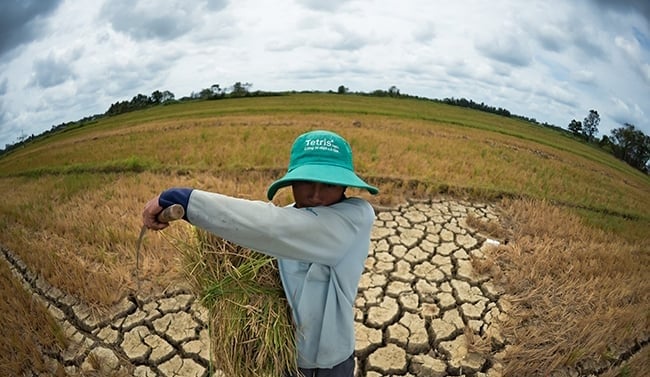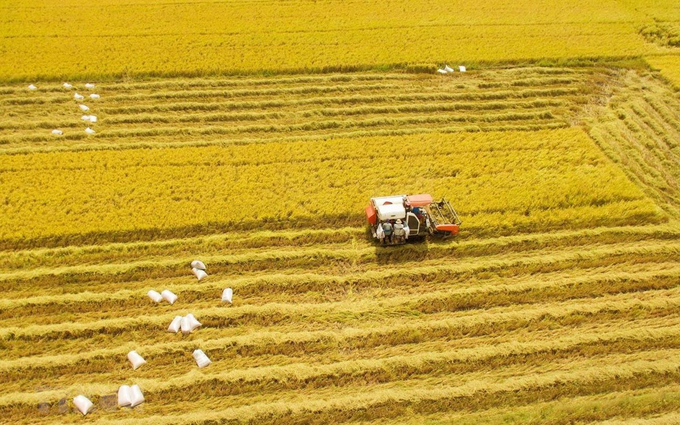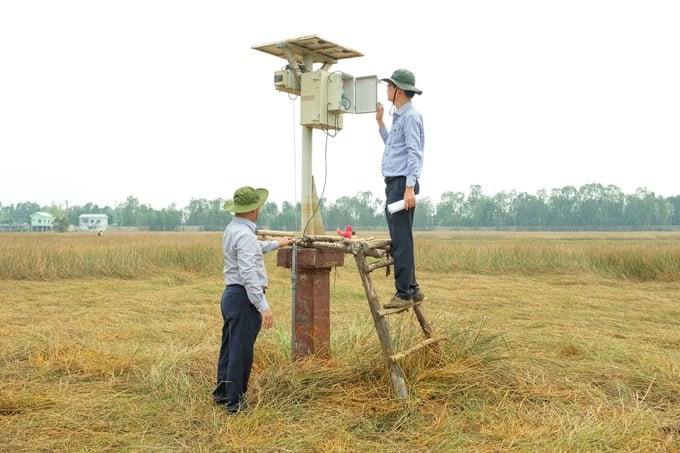November 23, 2025 | 15:47 GMT +7
November 23, 2025 | 15:47 GMT +7
Hotline: 0913.378.918
November 23, 2025 | 15:47 GMT +7
Hotline: 0913.378.918

Climate change is causing severe drought in the Mekong Delta. Photo: Manh Linh.
On March 18th, the Prime Minister accepted a proposal for the "Mekong Delta Climate Resilience and Integrated Transformation Project".
The project's total projected investment is USD 274.3 million, or 6,579 billion VND, with a World Bank (WB) loan of USD 205.5 million, or 4,932 billion VND. The non-refundable contribution from Australia is 10 million AUD, which is comparable to USD 6.5 million or 156 billion VND. The remainder comes from corresponding capital from the central budget.
As a result, the project's four components seek to improve the climate resilience of agricultural production operations and rural people in selected Mekong Delta regions. The Plain of Reeds (Dong Thap, Tien Giang, and Long An provinces) is expected to be impacted, as is the Southwest of the Hau River (Soc Trang, Bac Lieu, and Hau Giang provinces), the central area of the Ca Mau Peninsula (Hau Giang, Soc Trang, Bac Lieu, Can Tho, Kien Giang, and Ca Mau provinces), and the coastal areas of Tra Vinh and Ben Tre.
Within Component 1, the project focuses on building capacity, institutional frameworks, and decision support systems, with two sub-projects aimed at improving data, monitoring systems, management tools, and strengthening regional coordination in agricultural and rural development planning and investment.

The project's total projected investment is USD 274.3 million, or 6,579 billion VND, with a World Bank (WB) loan of USD 205.5 million, or 4,932 billion VND.
Component 2 will address regional climate resilience infrastructure investment with sub-projects such as minimizing the risk of riverbank erosion in the Mekong Delta region, upgrading climate resilience infrastructure and transforming the Mekong Delta region, and completing water control systems to enhance climate resilience capacity and serve agricultural production transformation in the Southwest region of the Hau River.
Component 3 promotes varied livelihoods and efficient rural economic adaptation to climate change. The fourth component contains material on project management, monitoring, and assessment.
The "Mekong Delta Climate Resilience and Integrated Transformation Project" achieves certain goals via the utilization of World Bank loan capital and non-refundable Australian government grants.
Accordingly, the project aims to build and improve data, monitoring systems, management tools, and enhance regional coordination; restore flood absorption capacity and the environment in flood-prone areas; control floods and salinity intrusion for key fruit-growing areas and meet the strong demand for conversion from other production types to fruit trees; minimize the risk of riverbank and coastal erosion; support stable freshwater supply and promote diversified livelihoods.
According to the authorized decision, the Ministry of Agriculture and Rural Development (MARD) is completely accountable to the Prime Minister and competent inspection authorities for the proposal's content as well as its compliance with legal project documentation requirements. MARD is in charge of assessing investment items to reduce duplication, waste, and inefficiency when generating the Project Pre-feasibility Study Report.

One of the components aims to upgrade climate resilience infrastructure and transform the Mekong Delta region, and complete water control systems to enhance climate resilience capacity. Photo: Quynh Chi.
According to the lender, as of October 4, 2022, the World Bank has granted USD 25.16 billion in grants, concessional loans, and credit to Vietnam via 216 programs since 1993. Vietnam's current portfolio includes 22 ongoing projects funded by the International Development Association and the International Bank for Reconstruction and Development, for a total net commitment of USD 4.74 billion.
According to the Vietnam Country Climate and Development Report, which was issued by the World Bank in July 2022, the country would need to spend around USD 368 billion between now and 2040 to establish a climate resilient and low-carbon economy.
Amid climate change difficulties, foreign partners are assisting Vietnam in altering agricultural methods and promoting sustainability in the Mekong Delta.After the Prime Minister of Vietnam released the National Green Growth Strategy for the period of 2021-2030 with a vision to 2050 and the National Action Plan on Green Growth for the period of 2021-2030 on October 1, 2021 and July 22nd, 2022, respectively, the Ministry of Agriculture and Rural Development of Vietnam worked out an action plan to implement the National Strategy on Green Growth for the period of 2021-2030 on September 12, 2022 and make efforts.
Translated by Dieu Linh

(VAN) Viet Nam’s forestry sector is undergoing a comprehensive transformation, strengthening management, protection, and development efforts to maintain ecological security and drive green, sustainable growth.

(VAN) Viet Nam is accelerating efforts to digitize reservoir operations, from real-time data to hydraulic modelling.
/2025/11/21/3348-2-102623_454.jpg)
(VAN) National Assembly delegate Nguyen Thi Lan has proposed adding special mechanisms to attract human resources to the agricultural, forestry, and fishery sectors, addressing the shortage of high-quality personnel.

(VAN) Over the past two decades, the unified legal framework for water resource management has been perfected, becoming a crucial foundation for ensuring national water security.

(VAN) The land-data cleansing campaign in Dien Bien is entering its final stretch, yet weak infrastructure, limited personnel and fragmented multi-period datasets continue to create major obstacles.
/2025/11/20/0204-2-115235_496.jpg)
(VAN) Not only do carbon credits bring a great revenue source, but they also contribute to better forest protection and development. However, this potential remains largely untapped.

(VAN) Applying modern technology is helping environmental monitoring and oversight of management quality.